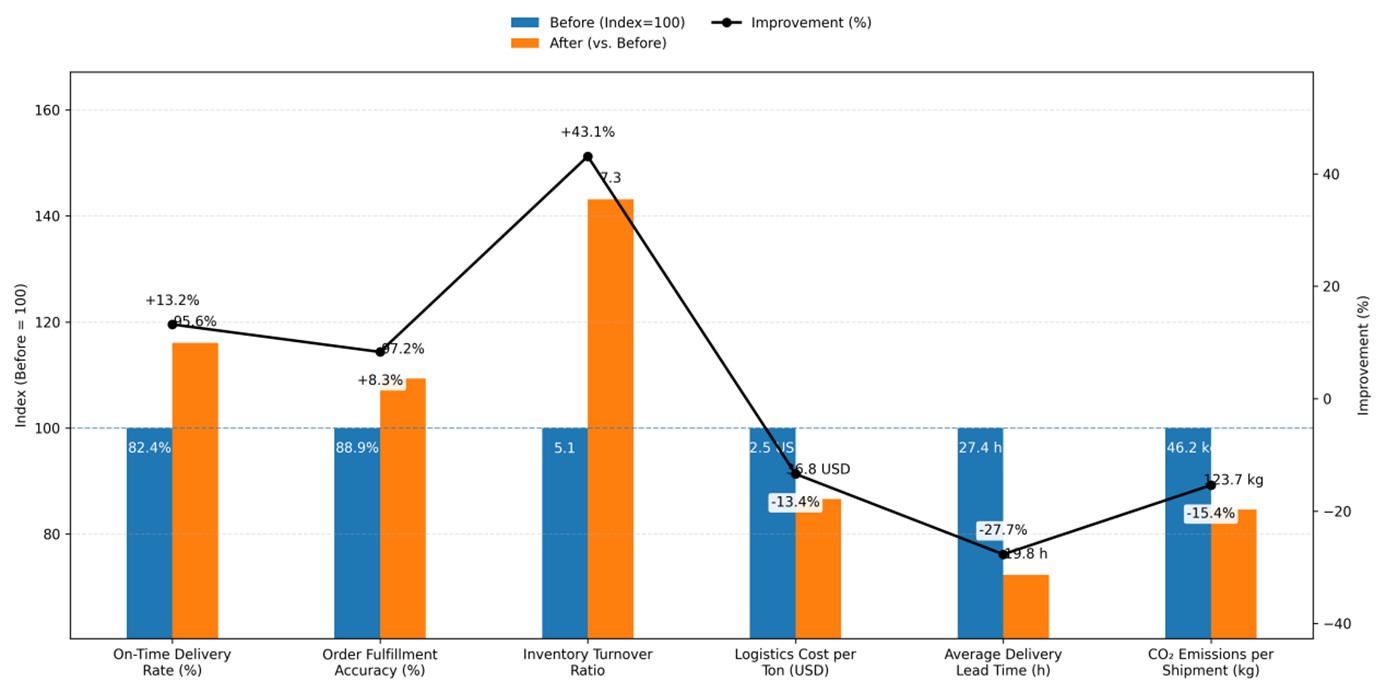Leveraging Digital Tools for Precision Logistics: IoT and ERP in Automotive Steel Distribution
Abstract
The automotive steel distribution industry faces increasing pressure to achieve higher efficiency, accuracy, and responsiveness. Traditional logistics models are limited by information silos, delayed coordination, and high operational costs. Leveraging digital tools such as the Internet of Things (IoT) and Enterprise Resource Planning (ERP) offers new opportunities for building precision logistics systems. This paper investigates how IoT enables real-time monitoring, data acquisition, and traceability in steel transportation, while ERP provides centralized management for inventory, orders, and scheduling. By constructing an IoT–ERP integration model, the study demonstrates how the synergy of both technologies can optimize the automotive steel distribution process. A case study highlights the practical application, showing improvements in delivery accuracy, inventory turnover, and operational efficiency. The findings indicate that IoT and ERP integration not only enhances supply chain transparency but also provides valuable insights for digital transformation in the automotive logistics sector.
References
[2] Canon, J. G. F., Dias, T. S. T., & Santos, D. D. C. S. (2025). Integrated logistics management through ERP system: A case study in an emerging regional market. Logistics, 9(2), 59. https://doi.org/10.3390/logistics9020059
[3] Adesola, O., Taiwo, I., & Adeyemi, D. D. (2025). Leveraging digital twin technology for end-to-end supply chain optimization and disruption mitigation in global logistics. World Journal of Advanced Research and Reviews, 25(1), 2274-2282. https://doi.org/10.30574/wjarr.2025.25.1.0314
[4] Pracucci, A. (2024). Designing digital twin with IoT and AI in warehouse to support optimization and safety in Engineer-to-Order manufacturing process for prefabricated building products. Applied Sciences, 14(15), 6835. https://doi.org/10.3390/app14156835
[5] Zafarzadeh, M., Ghadimi, N., Dolgui, A., & Bonyadi, A. (2025). A framework and system architecture for value-oriented digital services in data-driven production logistics. International Journal of Production Research, 1-21. https://doi.org/10.1080/00207543.2025.2480204
[6] Nuerk, J., & Dařena, F. (2025). Systems engineering methodology for digital supply chain business models. Systems Engineering, 28(3), 411-437. https://doi.org/10.1002/sys.21802
[7] Gomaa, A. H. (2025). Lean 4.0: A strategic roadmap for operational excellence and innovation in smart manufacturing. International Journal of Emerging Science and Engineering (IJESE), 13(4), 1-14. https://doi.org/10.35940/ijese.D2592.13050425
[8] Tolettini, L., & Di Maria, E. (2023). The impact of industry 4.0 on the steel sector: paving the way for a disruptive digital and ecological transformation. Recycling, 8(4), 55. https://doi.org/10.3390/recycling8040055
[9] Sufian, A. T., Abdullah, B. M., & Miller, O. J. (2025). Smart manufacturing application in precision manufacturing. Applied Sciences, 15(2), 915. https://doi.org/10.3390/app15020915
[10] Gomaa, A. H. (2024). Advancing manufacturing excellence in the industry 4.0 era: A comprehensive review and strategic integrated framework. Supply Chain Research, 2(2), 1-37. https://doi.org/10.59429/scr.v2i2.10220
[11] Ojadi, J. O., Agwu, M. E., Odunfa, K. S., & Nwalozie, S. C. (2024). Big data analytics and AI for optimizing supply chain sustainability and reducing greenhouse gas emissions in logistics and transportation. International Journal of Multidisciplinary Research and Growth Evaluation, 5(1), 1536-1548. https://doi.org/10.54660/.IJMRGE.2024.5.1.1536-1548
[12] Salman, S., Ali, M., Al-Turki, A., Hossain, M., & Kamal, M. M. (2025). Mapping industry 4.0 strategies for sustainable logistics: insights from the electronic industry in emerging markets. International Journal of System Assurance Engineering and Management, 1-19. https://doi.org/10.1007/s13198-025-02798-1
[13] Shivam, & Gupta, M. (2024). Inventory and warehouse management in industry 4.0: a BPR perspective. Journal of Information Technology Case and Application Research, 26(4), 365-400. https://doi.org/10.1080/15228053.2024.2433926
[14] Rehman, A., & Islam, M. (2023). IoT-enabled construction project monitoring systems a meta-analytical review of efficiency gains in large-scale infrastructure. American Journal of Scholarly Research and Innovation, 2(1), 130-166. https://doi.org/10.63125/fb995k33
[15] Ojadi, J. O., Agwu, M. E., Nwokoye, M. O., Odunfa, K. S., & Nwalozie, S. C. (2023). Leveraging IoT and deep learning for real-time carbon footprint monitoring and optimization in smart cities and industrial zones. IRE Journals, 6(11), 946-964.
[16] Dolgui, A., Ivanov, D., & Pavlov, A. (2024). Editorial for the special issue: AI and data-driven decisions in manufacturing. Journal of Intelligent Manufacturing, 35(8), 3599-3604. https://doi.org/10.1007/s10845-024-02499-9
[17] Elibal, K., & Özceylan, E. (2024). An industry 4.0 maturity model proposal based on total quality management principles: an application to an automotive parts manufacturer. IEEE Transactions on Engineering Management, 71, 10815-10832. https://doi.org/10.1109/TEM.2024.3397555
[18] Singh, P. K. (2023). Digital transformation in supply chain management: Artificial Intelligence (AI) and Machine Learning (ML) as Catalysts for Value Creation. International Journal of Supply Chain Management, 12(6), 57-63. https://doi.org/10.59160/ijscm.v12i6.6216
[19] Onukwulu, E. C., Odunfa, K. S., & Agwu, M. E. (2024). Advanced supply chain coordination for efficient project execution in oil & gas projects. International Journal of Multidisciplinary Research and Growth Evaluation, 5(4), 1255-1272. https://doi.org/10.54660/.IJMRGE.2024.5.4.1255-1272


This work is licensed under a Creative Commons Attribution 4.0 International License.
Copyright for this article is retained by the author(s), with first publication rights granted to the journal.
This is an open-access article distributed under the terms and conditions of the Creative Commons Attribution license (http://creativecommons.org/licenses/by/4.0/).








1.png)














